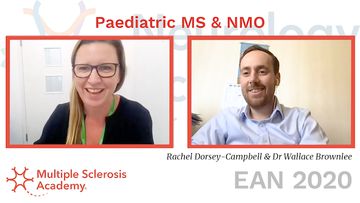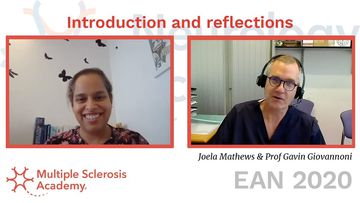DMT safety issues – EAN 2020
Event reportsJoela Mathews, Lead Neuroscience Pharmacist for Barts Health NHS Trust and Rachel Dorsey-Campbell, Senior Lead Pharmacist, Neurosciences, Imperial College Healthcare NHS Trust, discussed some of their highlights from the EAN 2020 focussing on drug safety.
Joela Mathews
Highly specialist pharmacist – neurosciences lead, Barts Health NHS Trust
Rachel Dorsey-Campbell
Senior lead pharmacist, Imperial College Healthcare NHS Trust
Alemtuzumab safety (0.39)
Rachel outlined a poster session on the safety of alemtuzumab over a nine year period in patients with non-MS autoimmunity. It investigated the relationship between pre-existing autoimmunity and a higher risk of developing autoimmunity in the future. The findings were that there was no correlation:
- Having autoimmune disease at baseline did not predict autoimmune problems later on
- Having a thyroid disorder at baseline did not mean a predisposition towards thyroid disorders later on.(fig 1)
Safety of alemtuzumab over +9 yrs in patients with non-MS autoimmunity
A Coles
Investigated the relationship between new auto-immune (AI) events & pre-existing autoimmunity.
Looked at those trial patients who had pre-existing AI (from medical history) –this was 7.9% of patients.
Data showed that AI adverse events were similar in pts with / without baseline autoimmunity.
Most patient with thyroid disorders at baseline did not get AI adverse events.
Conclusions:
– Pre-existing non-MS AI did not predict development of AI disease at up to 12 years of follow up
– Thyroid AI after alemtuzumab did not predict other AI disease
– Post-marketing data do not suggest that thyroid disease is associated with an increased risk of ITP, AI hepatitis or haemophagocytic lymphohistiocytosis
Fingolimod safety (2.01)
Joela discussed an Italian study examining real-world data looking at lymphopaenia in those with MS being treated with fingolimod or dimethyl fumarate, monitoring them at six and 12 months.
- During COVID-19, this study can help highlight which patients can be targeted for monitoring, and those who might be safer with reduced monitoring.
Fingolimod and DMF derived lymphopenia is not associated with short-term treatment response and risk of infection in a real life MS population
Nicola Bruschi
1. Objective to assess whether lymphopenia is associated with short-term treatment response and infection rate in real-life MS population treated with fingolimod and dimethyl fumarate, undertaken by evaluating association between baseline lymphocyte count and lymphocyte mean % decrease at 6 and 12 month with treatment response and adverse events over 12 month period.
2. 137 fingolimod and 75 DMT patients reviewed
3. Predictors of lymphopenia at 6 and 12 months
– Higher number of previous therapies
– Lower baseline absolute lymphocyte count
4. Predictors of lymphopenia at 12 months in fingolimod also include:
– Female
– Higher EDSS
Rachel discussed a French retrospective study (4.00) which had looked at the incidence of human papillomavirus (HPV) in patients with MS being treated with fingolimod.
- The study identified 14 patients who had had fingolimod for 3 years.
- They stopped the treatment in three patients which resulted in worsening of their MS.
- The speaker had not calculated the full volume of patients in their clinics, but estimated between 100 and 200 meaning there was between 7-14% risk of developing HPV on fingolimod.
- The study felt that the incidence was under-estimated and under-reported, and they recommended that vaccinations be given on a routine basis before treatment with fingolimod.
- Rachel noted that the guidance says vaccination should be considered, but that she does not routinely do this in practice and she was surprised by the study’s findings.
- Joela questioned whether this means that the whole class of S1P inhibitors ought to be considered in this light, as more become available in the near future.
- Accessibility of that vaccine in this patient group could be difficult - this may require discussions with public health.
- Joela questioned whether the standard incidence is known in other patient groups, and whether, if you are ‘looking for it’ you are likely to get a higher incidence.
Ocrelizumab – efficacy and safety (7.15)
Joela noted attending a number of sessions on ocrelizumab’s efficacy and safety; one of which was looking at biomarkers across B cells, T cells and inflammatory CSF biomarkers in both primary progressive and relapsing remitting MS patients treated with ocrelizumab.
Joela had a number of questions about what the results of this study mean:
- Could a reduction in these biomarker levels indicate treatment is working
- If it did not occur could that be a stopping criteria for the medication?
She noted that more research into this area could mean more people could start the therapy, and she questioned whether we should be using these biomarkers as a rule to measure efficacy of the drug, as opposed to always using EDSS scores to evaluate benefits.
Rachel shared her hopes that the real-world data for ocrelizumab will show a correlation between clinical effect and B cell suppression, and the immunoglobulin drops, also.
B cells, T calls and inflammatory CSF biomarkers in PPMS and RMS in OBOE (ocrelizumab biomarker outcome evaluation) trial
1. Hypothesis generating study designed to examine multiple biomarkers of neurodegeneration and inflammation as well as markers of B cell mechanisms in MS
2. Baseline CSF B cell, T cell and inflammatory marker levels were similar in PPMS and RMS, while NfL levels were higher in RMS compared to PPMS
3. CSF B cell, T cell and CXCl 13 (chemokine) levels were reduced following ocrelizumab in pt with PPMS and RMS
Rachel shared a poster from Brighton regarding infusion-related reactions (IRRs) on ocrelizumab (9.48). The poster was timely with the summary of product characteristics (SpC) updated to allow shorter infusions.
- The study looked at 28 patients (43% had no prior DMTs)
- They looked at IRRs as defined as per SpC ( mild – continue, moderate – reduce rate, severe – stop)
- 82% had no or mild reactions - reassuring that over half of people had no reaction to note which can be supportive for patients assessing their choices.
- 14% had moderate or severe IRRs
Siponimod long-term efficacy (11.35)
Siponimod EXPAND extension study - they did not produce the safety data but they have found supportive efficacy data across five years. Joela pointed out that, for secondary progressive MS, we want a long-term use with positive outcomes, and this evidence was welcome.
Long term efficacy of siponimod tx for upto 5 yrs in pts with SPMS: analysis of EXPAND extension study
L Kappos
1. To assess the long term efficacy of siponimod in pt with SPMS from core and extension part of the EXPAND phase 3 study
2. The tx benefit of siponimod observed in the core study was sustained with long term treatment for upto 5 years (also showed greater benefits of earlier treatment with siponimod in SPMS)
Study added to evidence of long term benefit of siponimod in SPMS.
MS triggered by other biologics (12.32)
Poster on central-nervous system (CNS) side-effects related to biologics related to conditions other than MS. The case series included patients with CNS complications from a range of biologic drugs including Etanercept , infliximab, adalimumab, golimumab which are used to treat conditions like Crohn’s and Psoriatic arthritis.
- There were 4 cases of clinically isolated syndrome (CIS)
- New and worsening cases of optic neuritis and relapsing-remitting MS
- Rachel concluded that this series of studies highlights the need for surveillance of CNS effects of these drugs, and that prompt discontinuation is needed where these results are seen.
- Rachel noted that she has seen this in practice where MS is triggered by other biologics and shared that it is an area to keep an eye on.

This activity has been sponsored by Roche Products Limited. Roche Products Limited has had no control over the educational content of this activity.
Related articles
Encouraging excellence, developing leaders, inspiring change
MS Academy was established in 2016 and in that time has accomplished a huge amount with exciting feedback demonstrating delegates feel inspired and energised along their personal and service development journeys. The various different levels of specialist MS training we offer are dedicated to case-based learning and practical application of cutting edge research.




